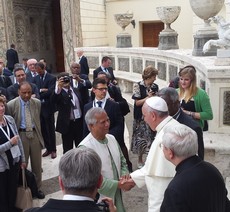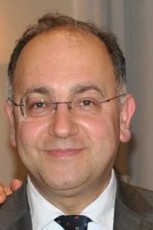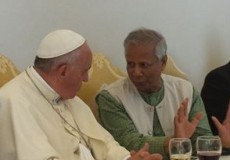An Interview with Luigino Bruni
by Antonella Ferrucci

We would like to know how he feels about this meeting and what impressed him most.
I had never met Pope Francis in person before, let alone having lunch in his presence. I was impressed by many things, all positive. First of all, his intense and attentive listening. There were many people who sat next to him (on a chair that was left empty on purpose), to tell him their dreams, aspirations and requests. Among them, the Nobel Peace Prize Laureate M. Yunus, who said ‘Help me, Holy Father, to spread finance for the poor’.
He listened to them as if he had come only for them, and forgot even about the meal. Then it also impressed me to see his teaching 'incarnated' in his actions and behaviour: he did not say many words, but “spoke” by being with us for two hours, and through this powerful language he managed to say how important economy is in his vision of the church. Then his gratitude: the word he used most was 'thanks': thank you for your research efforts, thank you.' He said that several times to us. ‘Thank you for what you do’, he said repeatedly, and not out of courtesy, many times, throughout the meeting.
What kind of pope is Pope Francis, in your experience?
I only spent two hours with him. But I follow him with much attention from that first evening on St. Peter's Square. He is a humble pope, in the truest sense of the word, who puts himself on par with others, neither above nor below the person in front of him. I really like his language: he is a master in the use of images, which is very reminiscent of that of the Gospels. And just as Jesus in the Gospels, through his words he touches the hearts of the people, of the wise ones and the little ones. I found it a brilliant idea how he translated – during that lunch – the somewhat complicated concept of anthropological reductionism with the metaphor of the still in which the wine (man) enters and grappa comes out (which is something else, maybe useful, but something else). ‘Today there is no other person as authoritative as the pope in the worl’, as Governor of the Bank of England Carney told me who was sitting next to me at lunch. It's true, and the Pope has taught us to take part in this sort of ‘Davos of the poor’, in order not to remain indifferent or distant, impartial observers. It is necessary to select a departure point for our observations on the world.
Which one should it be?







